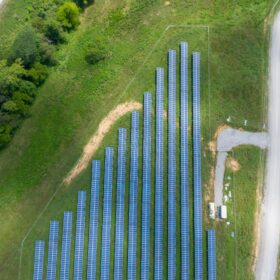Second-life EV batteries as grid-scale storage
Startup company Smartville received $5.9 million from the Department of Energy to scale its second-life battery program.
California evaluates impacts of an RTO and its effects on state energy goals
A report requested by California’s legislature discusses both expected cost savings from expanding the state’s grid operator into a regional transmission organization, and a potential loss of state policy control.
Guide for understanding solar production losses
Aurora Solar offers guidelines to make the most of a solar installation by avoiding losses.
Sunrise brief: Solar produced nearly 5% of U.S. electricity in 2022, generation up 25%
Also on the rise: Silicon Ranch expands First Solar module supply plan to 6.2 GW. Sono Motors scraps development of Sion solar cars. And more.
Developer takes over New York landfill solar site
The Brookhaven brownfield site spans 35 acres of limited use, capped landfill where over 16,000 solar panels will be constructed using a fixed-tilt, ballasted installation. The solar facility will feed into utility PSEG-LI’s grid.
Thermal battery offers fast, efficient performance at low cost
A scalable thermal energy storage prototype system that combines the best latent and sensible heat transfers is now market-ready after three years of testing. It consists of engineered cementitious materials and thermosiphons in a combination that enables fast, efficient thermal performance at low cost.
Credit renewables and storage fairly for their capacity value, says ESIG
An Energy Systems Integration Group report calls for improved approaches to crediting resources for their capacity contribution, starting with fair treatment for all resources.
U.S. DOE announces $48 million in funding to modernize the grid
Funded projects will develop much-needed technologies that will minimize power grid failures and streamline cost-efficient grid operations at a time when clean energy capacity is growing rapidly.
NREL Industry Growth Forum featuring cleantech startups from around the world
Now in its 28th year, the forum facilitates connections between for cleantech entrepreneurs and investors, helping to drive innovation to market.
Solid-state battery design uses metal blend electrolyte
New battery materials tested by Berkeley Labs and Florida State University could result in a more conductive solid-state electrolyte that is less dependent on a large quantity of individual metals, which proves effective for the huge demand in the EV market.















